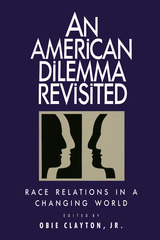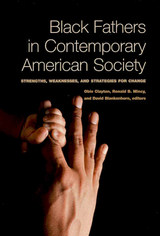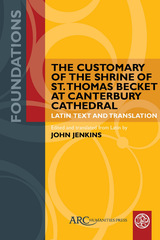2 books by Clayton, Obie

An American Dilemma Revisited
Race Relations in a Changing World
Obie, Jr. Clayton
Russell Sage Foundation, 1996
"This book must be regarded as a greatly important contribution to race relations literature. It is invaluable for the manner in which authors combine the lessons of history with insightful analyses of empirical data to demonstrate patterns of change over the past fifty years in the status of African Americans... Provocative and stimulating reading." —James E. Blackwell, University of Massachusetts, Boston "Presents a wide-ranging reanalysis of the seminal work done by Gunnar Myrdal in 1944, examining virtually every issue that Myrdal noted as relevant to the American race question. In so doing, Clayton and his contributors have brought the matter up to date and shown how the American dilemma continues into the twenty-first century." —Stanford M. Lyman, Florida Atlantic University Fifty years after the publication of An American Dilemma, Gunnar Myrdal's epochal study of racism and black disadvantage, An American Dilemma Revisited again confronts the pivotal issue of race in American society and explores how the status of African Americans has changed over the past half century. African Americans have made critical strides since Myrdal's time. Yet despite significant advances, strong economic and social barriers persist, and in many ways the plight of African Americans remains as acute now as it was then. Using Myrdal as a benchmark, each essay analyzes historical developments, examines current conditions, and investigates strategies for positive change within the core arenas of modern society—political, economic, educational, and judicial. The central question posed by this volume is whether the presence of a disproportionately African American underclass has become a permanent American phenomenon. Several contributors tie the unevenness of black economic mobility to educational limitations, social isolation, and changing workplace demands. The evolution of a more suburban, service-dominated economy that places a premium on advanced academic training has severely constrained the employment prospects of many urban African Americans with limited education. An American Dilemma Revisited argues that there is hope to be found both in black educational institutions, which account for the largest proportion of advanced educational degrees among African Americans, and in the promotion of black community enterprises. An American Dilemma Revisited asks why the election of many African American leaders has failed to translate into genuine political power or effective policy support for black issues. The rise in membership in Pentecostal and Islamic denonimations suggests that many blacks, frustrated with the political detachment of more traditional churches, continue to pursue more socially concerned activism at a local level. Three essays trace social disaffection among blacks to a legacy of police and judicial discrimination. Mistrust of the police persists, particularly in cities, and black offenders continue to experience harsher treatment at all stages of the trial process. As Myrdal's book did fifty years ago, An American Dilemma Revisited offers an insightful look at the continuing effects of racial inequality and discrimination in American society and examines different means for removing the specter of racism in the United States.
[more]

Black Fathers in Contemporary American Society
Strengths, Weaknesses, and Strategies for Change
Obie Clayton
Russell Sage Foundation, 2003
The majority of African American children live in homes without their fathers, but the proportion of African American children living in intact, two-parent families has risen significantly since 1995. Black Fathers in Contemporary American Society looks at father absence from two sides, offering an in-depth analysis of how the absence of African American fathers affects their children, their relationships, and society as a whole, while countering the notion that father absence and family fragmentation within the African American community is inevitable. Editors Obie Clayton, Ronald B. Mincy, and David Blankenhorn lead a diverse group of contributors encompassing a range of disciplines and ideological perspectives who all agree that father absence among black families is one of the most pressing social problems today. In part I, the contributors offer possible explanations for the decline in marriage among African American families. William Julius Wilson believes that many men who live in the inner city no longer consider marriage an option because their limited economic prospects do not enable them to provide for a family. Part II considers marriage from an economic perspective, emphasizing that it is in part a wealth-producing institution. Maggie Gallagher points out that married people earn, invest, and save more than single people, and that when marriage rates are low in a community, it is the children who suffer most. In part III, the contributors discuss policies to reduce absentee fatherhood. Wornie Reed demonstrates how public health interventions, such as personal development workshops and work-related skill-building services, can be used to address the causes of fatherlessness. Wade Horn illustrates the positive results achieved by fatherhood programs, especially when held early in a man's life. In the last chapter, Enola Aird notes that from 1995 to 2000, the proportion of African American children living in two-parent, married couple homes rose from 34.8 to 38.9 percent; a significant increase indicating the possible reversal of the long-term shift toward black family fragmentation. Black Fathers in Contemporary American Society provides an in-depth look at a problem affecting millions of children while offering proof that the trend of father absence is not irrevocable.
[more]
READERS
Browse our collection.
PUBLISHERS
See BiblioVault's publisher services.
STUDENT SERVICES
Files for college accessibility offices.
UChicago Accessibility Resources
home | accessibility | search | about | contact us
BiblioVault ® 2001 - 2024
The University of Chicago Press









